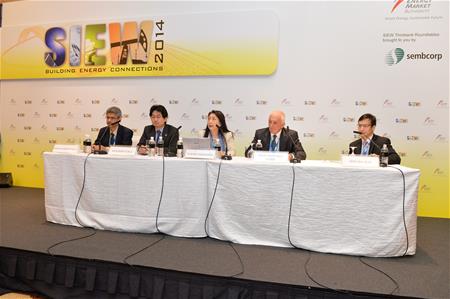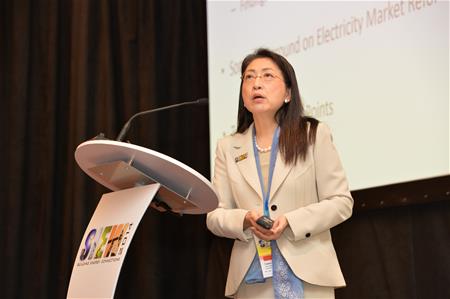
Panelists at the Electricity Market Reform Roundtable, hosted by IEEJ, include (L-R) Datuk Fauzi, Kazunari Fukui, Yukari Yamashita, Anthony Owen, and Soh Sai Bor.

Ms Yukari Yamashita, Director of The Institute of Energy Economics, Japan, shares her thoughts on electricity market reform and Asia's energy situation.
By Amanda Tan
Security of supply is a key factor in the success of electricity market reform, along with clear regulations and solid mechanisms, experts said on Thursday during a roundtable discussion at Singapore International Energy Week 2014.
Kazunari Fukui, the Asia-Pacific marketing director for GE Power & Water, listed five core elements of market reform: Purpose, starting conditions, market design, implementation dynamics and competitive forces.
“There is no simple formula,” he said. “Each reform requires careful consideration of the initial conditions and evolving dynamics.”
Yukari Yamashita, director of the Energy Data and Modelling Center at The Institute of Energy Economics, Japan, highlighted changes in the electricity market, in particular how vertically integrated monopolies were now deregulated and liberalised for more efficient power supply.
In Malaysia, reforms include the ring-fencing of a single buyer and system operator with market rules and regulatory oversight as well as incentive-based tariff regulation with accounts unbundling, a performance incentive scheme and a cost pass-through mechanism, said Ahmad Fauzi bin Hasan, chief executive officer of the Energy Commission of Malaysia.
The reform process features “no regrets” steps and implementation steps, he said.
Soh Sai Bor, director of the Market Development and Surveillance Department at Singapore’s Energy Market Authority, noted that the country relies on imported natural gas to meet most of its energy needs. He said Singapore will continue to streamline the market system with new features such as a demand response scheme to give consumers more options to manage their power costs.
“Beyond LNG infrastructure, we have also put in place a competitive licensing framework on a tranche-by-tranche basis to meet incremental demand,” Soh said. “We will continue to keep our energy options open for greater diversification to enhance energy security and cost competitiveness.”
About Singapore International Energy Week (www.siew.gov.sg)
The 7th annual SIEW 2014 is the foremost platform for top policymakers, energy practitioners and commentators to discuss energy issues, strategies and solutions. SIEW brings together a robust line-up of world's leading conferences, exhibitions, roundtables and networking events to provide insights and perspectives on the emerging trends and innovations across the energy spectrum of oil & gas, clean and renewable energy, and energy infrastructure financing – in one week, one location. Please visit www.siew.gov.sg for further information.